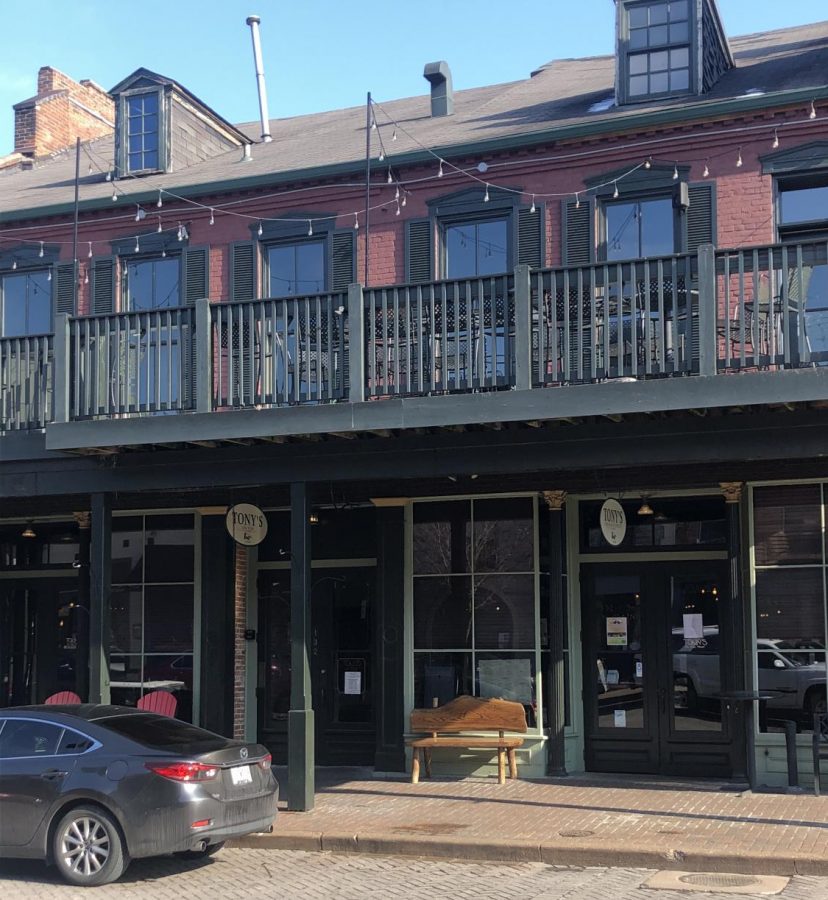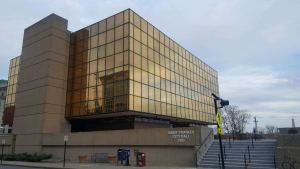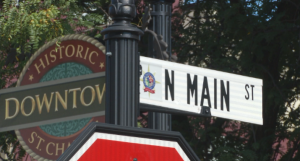Another attempt to change alcohol law sparks debate in City Council meeting
Photo by Alexis Montgomery
Tony’s on Main, a restaurant on North Main Street.
February 8, 2020
In the latest attempt to change a controversial liquor law passed in 2018, the St. Charles City Council introduced two bills in its meeting Tuesday, which saw a heated discussion between the mayor and citizens who opposed the changes.
The bills, which will come up for a vote on Feb. 18, are nearly identical to a single bill introduced in November, which the council has not voted on. One of the bills would change how liquor license infractions are punished. The other bill removes a requirement that restaurants on North Main Street earn no more than half their revenue from alcohol, a regulation some have said is unnecessary and harmful for business.
Three Main Street business owners spoke against the new bills at the meeting, saying the 2018 law reduced crime and problems with rowdy nightlife, but Mayor Dan Borgmeyer responded that the law was not the cause of the improvements.
One of the speakers, Randy Schilling, founded OPO Startups, a company that owns nine properties on Main and rents work space to businesses and freelancers.
He said a number of new businesses have come to Main since the law was passed and listed two dozen startups who have started working at OPO in St. Charles.
Jim Eberlin, the owner of one of these startups, told the council he decided to move his business from St. Louis in part because North Main had gotten safer.
“As a business owner here on Main Street, I love what you got, I love the progress that’s being made there, and I’d like to preserve the historical aspect of what we have and focus more on those kinds of things,” he said.
The third speaker was Penny Pitman, president of a company that leases buildings on Main. She suggested there may be problems with the current law, but it should be fixed without allowing more bars.
“We’ve already proved that too many [bars] caused problems,” she said. “We no longer see the videos of people beating each other up and fights in the garage.”
According to data from the St. Charles Police Department, there were 73% more reported incidents in the area around Main in 2018 than in the first 10 months after the law went into place, and they were most common on North Main.
In response to the citizens’ objections, the mayor said that the 50% food requirement was an “overreaction” and did not cause the drop in crime. The businesses that had been causing problems met the quota, and those that did not meet it, were not causing problems, he said.
“The premise that food controls behavior, in my opinion, is highly misfounded,” Borgmeyer said. “The situation on Main Street was resolved through communication. Since I have been mayor, I have met consistently with the bars. You don’t see the one-dollar shot specials anymore. The music has been mitigated. The speakers do not blare into the streets. We’ve added police presence. We’ve added LED lighting you can see through your eyelids at night, it’s so bright.”
Borgmeyer added that the alcohol regulations deter new restaurants from coming to North Main.
“If you’re in tune with what’s going on in the restaurant business, if you have two glasses of wine apiece and an entree, your wine bill is going to be more than your food bill, and there’s going to be no 50% match,” he said.
Under current law, liquor license holders in St. Charles can lose their license if they get more than three points. Currently, serving minors or visibly intoxicated patrons and exceeding the occupancy limit will put a restaurant over this limit after only one offense. The new bills would lower the number of points for these violations so that they would not.
“I think if someone serves an underage minor one time, they shouldn’t lose their liquor license and their business over it,” Borgmeyer told Lindenlink.
The bills would also let points expire after 12 months and establish an appeal board for liquor license violations. Currently, violations are appealed to the same board that issues them.
Both new bills are sponsored by city council members Bridget Ohmes, Donalee Gastreich, and Mary West.















Penny L Pitman • Feb 9, 2020 at 3:20 pm
Other corrections: The Mayor’s comment that if you serve one minor you lose a license is untrue. A citation for underage drinking is 3 points not 3.5. The current ordinance calls for 6 points for the commission to even consider suspension of a license. The Mayor’s comment that I owned a bar called is also untrue. The current ordinance may need some changes, many of us understand that the 2018 new ordinance may need some tweaking. Point amounts, Composition of commission, appeals commission could be considered. The Mayor’s current ordinance removes the specific points applied to specific items and leaves it all arbitrarily assigned by a commission appointed by the Mayor..
Many of us who have been involved and invested in the HD area for years building a comfortable and lively mixed-use historic preservation area are feeling assaulted by having more publicity brought to bear again on liquor ordinances when it is unnecessary. A couple of simple amendments to the existing ordinance could be helpful; no new, confusing ordinances with new definitions and new terms
are needed.
Several of us have suggested changes that could make some sense and save the businesses that cannot meet the 50% food requirement. Since 1995 there have been no new bar only licenses available in the historic downtown area because it is a historic preservation area and food is an important part of the mixed-use area as are retail, residential, professional, service. Since 1995 there has been a $200,000 food requirement in order to secure any liquor license. Tuners was there since long before 1995 and does have a bar license but does serve food.
The Mayor acknowledged he owns properties on Main Street and has been the major impetus to again changing the liquor ordinance
Matt Hampton • Feb 11, 2020 at 12:13 pm
We appreciate your input and perspective in response to our article. However, your comment contains some inaccuracies about the article, which we would like to address.
It is true that the mayor was incorrect when he said a violation for serving a minor is 3.5 points. It is only 3.0 points, but this does allow an establishment to have its license suspended after only one offense. Under section 600.260.J of the existing law, in Bill 12622, it reads, “When points assigned to a license reach the significant category, the Commission may suspend the license” (p. 26 of the agenda linked below). “Significant” is defined on p.24 (600.260.F) as 3.0 to 6.0 points.
It is also incorrect that the new bill would remove specific points listed in the law; they are still defined in 600.260.E (p.215 on the agenda from last meeting)
Tuesday’s meeting agenda with new bill: https://www.stcharlescitymo.gov/AgendaCenter/ViewFile/Agenda/_02042020-969
2018 agenda with existing law: https://www.stcharlescitymo.gov/AgendaCenter/ViewFile/Agenda/_09252018-778
We always strive for consistent accuracy and trustworthiness in our coverage, and input from our readers is important to allow us to explain or remedy complaints about our content.
Penny L Pitman • Feb 9, 2020 at 3:15 pm
The Mayor’s Comments and Self-Dealing Feb. 4 council meeting
Mayor Borgmeyer acknowledged in this video of a publicly televised Council Meeting February 4th, 2020 that he owns properties on Main Street in the HD area being affected by his proposed liquor license bills. His wife/companion has also purchased a property on N. Main shortly after his election. Mayor Dan is trying to push through and has participated in writing these bills. This Mayor clearly has a significant conflict of interest. Mayor Borgmeyer should recuse himself from any discussion and/or promotion of of changing ordinances affecting his own properties. A great natural tendency to self-deal over the interest of other citizens and property owners exists. It is unethical to self-deal by an official elected to represent and serve the community. Self- dealing is difficult to overcome as a basic part of human psychology. The Mayor and his wife/companion have been pursuing purchase of other Main Street properties which will make it difficult to stay out of a conflict of interest situation. The Council could and should act to take care of their responsibility to citizens and separate the Mayor’s clear self-interest in his own betterment. It would be an unbelievably hard tendency to overcome.